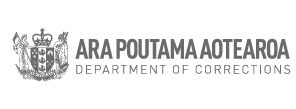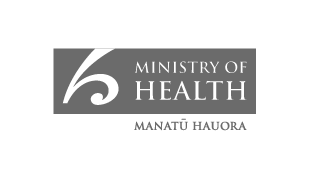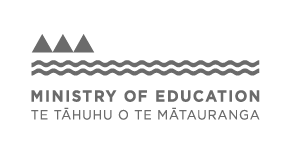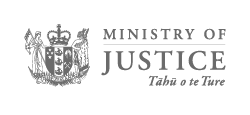On this page
The Joint Venture was formed in 2018 to improve the whole-of-government approach to family Violence and sexual violence.
In 2022, the Joint Venture became Te Puna Aonui, an Interdepartmental Executive Board under the Public Service Act 2020.
Te Puna Aonui agencies are responsible for implementing Te Aorerekura – the National Strategy to Eliminate Family Violence and Sexual Violence.
Together, we:
Strategic Intentions
Read our Strategic Intentions document [PDF, 1.4 MB] to see what we will deliver and how we will work.
Te Puna Aonui describes the collective of government agencies, the Board, and the team working in the business unit.
Te Puna Aonui includes:
There are 4 associate agencies of the Joint Venture:
In December 2021, Cabinet Ministers agreed to establish the Joint Venture for Family Violence and Sexual Violence as an interdepartmental executive board. The (external link). The Cabinet paper and Minute(external link) are available on the Public Service Commission website.
Government agencies will build on the work of the Joint Venture in this new structure(external link) to enable the collaborative responses, clear roles and responsibilities required to deliver Te Aorerekura.
The Board has agreed a set of Operating Procedures [PDF, 228 KB] to guide the way it works as a collective to eliminate family violence and sexual violence. Board members must follow “core duties”, which include:
· requirements to share information,
· taking a system view rather than agency specific view,
· driving Action Plan programme delivery and
· providing assurance on progress.
Te Puna Aonui operates with a system-wide view and is a single point of accountability that enables government agencies to work in a ‘joined-up’ way, to improve coordination and enable a collective approach. A joint response can make a big difference to eliminating family violence and sexual violence. This aims to improve the system and improve responses to complex family violence and sexual violence issues in a sustainable way.
This approach also aims to support non-government agency (NGO) providers that respond to family violence and sexual violence so that people impacted by violence can access appropriate support without re-traumatisation.
Te Puna Aonui brings government agencies together to align whole-of-government strategy, policy and investment to eliminate family violence and sexual violence. Individual Joint Venture agencies are responsible for delivering and funding family violence and sexual violence services, programmes, and prevention initiatives.
Te Puna Aonui is not a funding agency. If you are seeking funding, please contact the relevant government agency. In particular, the Ministry of Social Development, ACC, and the Ministry of Justice can provide support for victim/survivors of violence and may consider funding proposals that contribute to the current prevention system.
Te Puna Aonui is led by the Interdepartmental Executive Board for the Elimination of Family Violence and Sexual Violence, which brings together leaders of the members agencies to align whole-of-government strategy, policy and investment to eliminate family violence and sexual violence.
This Board includes Secretary of Justice Andrew Kibblewhite as Chair, and Emma Powell, the Chief Executive of Te Puna Aonui. This creates a single point of accountability and leadership. The group reports to the Minister for the Prevention of Family Violence and Sexual Violence, Hon Karen Chhour.
Improving the New Zealand’s family violence and sexual violence system to enable wellbeing requires change on multiple levels. Te Tiriti o Waitangi, te ao Māori, and whānau-centred approaches are central to Te Aorerekura. They provide a unique perspective about how safely and wellbeing can be realised for all people, while maintaining a focus on victims.
Te Aorerekura, the National Strategy and Action Plans to Eliminate Family Violence and Sexual Violence will help give effect to Te Tiriti o Waitangi by:
Māori are over-represented in experiencing family violence and sexual violence. To honour Te Tiriti, the Joint Venture is focused on unlocking the solutions held within Te Ao Māori, especially around building capability, learning to hear victims’ voices and sharing power.
The Tangata Whenua Ministerial Advisory Group (MAG) was appointed in June 2022 to provide independent advice on the implementation of Te Aorerekura – the National Strategy to Eliminate Family Violence and Sexual Violence.
The MAG will have a significant role in creating family violence and sexual violence systems and supports that are governed and led by, and for, tangata whenua in the best interests of their whānau, hapū, iwi and all communities.
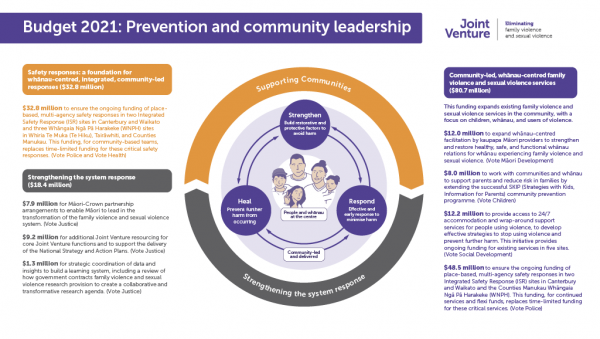
Historically, the family violence and sexual violence sectors have been underfunded, creating significant gaps in services for people and limits to the capacity and capability of responses the system offers.
The government is investing over $800 million over the next four years into addressing family violence and sexual violence. Budgets 2018-2020 mainly increased funding for specialist family violence and sexual violence services. This investment stabilised the family violence and sexual violence sectors with more funding for services and a joint approach to investment and planning.
Last modified:
